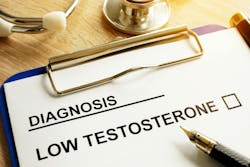Low testosterone in men associated with higher risk for death
A systematic review and meta-analysis found that a low baseline (endogenous) serum testosterone concentration in men is associated with increased risk for all-cause mortality, and a very low baseline testosterone with increased risk of cardiovascular death.
The findings are published in Annals of Internal Medicine.
Researchers from the University of Western Australia, collaborating with researchers from Australia, Europe, and North America, reviewed 11 studies comprising more than 24,000 participants to clarify associations of sex hormones with mortality and cardiovascular disease (CVD) risk in aging men. Eligible studies were prospective cohort studies, previously identified in a published systematic review, of community-dwelling men with total testosterone concentrations measured using mass spectrometry and at least 5 years of follow-up. Individual patient data (IPD) was used to summarize relationships between baseline hormone concentrations (total testosterone; sex hormone-binding globulin, luteinizing hormone, dihydrotestosterone, and estradiol) and relative risk for CVD events, CVD deaths, and all-cause mortality. The data showed that only men with low total testosterone concentrations had higher risks for all-cause mortality. A key finding was that men with a testosterone concentration below 7.4 nmol/L (<213 ng/dL) had higher risk for all-cause mortality, regardless of LH concentration. Men with a testosterone concentration below 5.3 nmol/L (<153 mg/dL) had increased risk of cardiovascular death.
In addition, to perform the IPD meta-analysis, the authors obtained raw data from 9 of the included studies and then reanalyzed the combined data.

